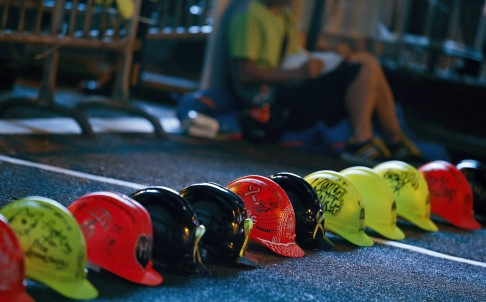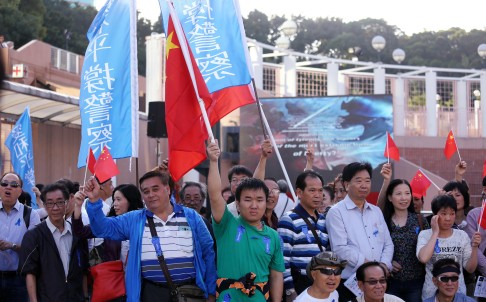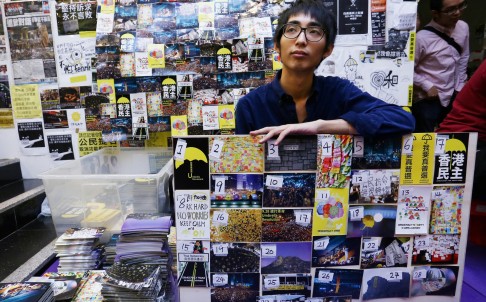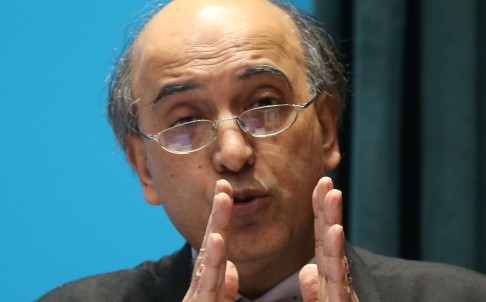Occupy Central
Occupy Central is a civil disobedience movement which began in Hong Kong on September 28, 2014. It calls on thousands of protesters to block roads and paralyse Hong Kong's financial district if the Beijing and Hong Kong governments do not agree to implement universal suffrage for the chief executive election in 2017 and the Legislative Council elections in 2020 according to "international standards." The movement was initiated by Benny Tai Yiu-ting (戴耀廷), an associate professor of law at the University of Hong Kong, in January 2013.
OCCUPY CENTRAL - DAY 58: Full coverage of the day’s events
Occupy protest organisers split over plan to hand themselves in to police
Student heads say they're staying but Occupy founders reveal they will hand themselves in
PUBLISHED : Monday, 24 November, 2014, 4:08am
The three co-founders of Occupy Central plan to turn themselves in to police next week but vowed to continue supporting protesters under a "two-stage" surrender plan.
 But the decision, made after a meeting between the trio and their volunteers on Saturday, puts them at odds with student leaders - a major force behind the sit-ins - who said they would continue until they were arrested.
But the decision, made after a meeting between the trio and their volunteers on Saturday, puts them at odds with student leaders - a major force behind the sit-ins - who said they would continue until they were arrested.
Under the tentative plan, the trio - Benny Tai Yiu-ting, the Reverend Chu Yiu-ming and Dr Chan Kin-man - and a small number of core supporters will turn themselves into police on December 5, while another group of the civil disobedience movement's volunteers may follow suit after the pro-democracy sit-in ends.
"The two-stage plan aims at cooling down tensions on both sides," said a source close to the camp. "While we want to tell society that we do not intend to destroy the rule of law, we hope occupiers can understand that we are not deserting them."
They would continue to provide medical and legal assistance to protesters.
But Lester Shum, deputy secretary general of the Federation of Students, said: "We students think that it's not the right moment to turn ourselves in yet as we are inclined to finish the final step of civil disobedience by being arrested."
While both Labour Party stalwart Lee Cheuk-yan and Civil Party leader Alan Leong Kah-kit ruled out handing themselves in before the movement ended, the Democratic Party will meet Occupy Central co-founders tomorrow to decide their stance.
The Occupy trio originally intended to hand themselves in last Friday but decided to postpone it to observe how bailiffs cleared the Mong Kok site, which is now subject to an injunction order.
One occupier, Sies Chan Kwan-yin in Admiralty, said he would answer the calls of Occupy founders to retreat after they turned themselves in. "I agree that the movement has to end one day, and this is the right time," Chan said.
But another occupier, Yves Leung, said she would stay.
"We have to stay to put pressure on the authorities. If we leave now, the whole purpose of the movement would be gone."
A recent poll of more than 2,100 people in the sit-ins suggested that half would retreat if asked by campaign leaders.
Meanwhile, sit-in organisers kicked off a campaign yesterday to take the "umbrella movement" to the community, drawing a mixed response.
Teenage activists from protest group Scholarism who set up a street booth in Tseung Kwan O were pelted with water bombs.
Scholarism's leader, Joshua Wong Chi-fung, said masked men had harassed them at all five street stations. Wong was pushed to the ground at the station in Po Lam, Tseung Kwan O. His 27-year-old attacker, a roadside promoter for an internet service provider, was arrested for assault.
In Wan Chai, a man (pictured above) who only gave his surname, Ngan, jabbed a finger at Shum and said the democracy fight "should not be carried out at the expense of others".
But some pedestrians gave a thumbs up to the students.
This article appeared in the South China Morning Post print edition as Protest leaders split over surrender
PUBLISHED : Monday, 24 November, 2014, 5:17am
UPDATED : Monday, 24 November, 2014, 5:17am
Occupy organisers should get out of their tents and finish what they started
Alice Wu says those who began the Occupy movement have a moral obligation to step up, take responsibility and end the protests
A "jaded" Occupy leader Benny Tai Yiu-ting barricaded himself inside his tent for days after government officials called off planned October 9 talks with student leaders. He tried to explain his brief bout of "autism" - as he termed it afterwards - by saying he didn't want to come out because he couldn't find solutions to some problems, and that "my brain just did not function well". In other words, Tai was discombobulated.
Today, it's clear that the movement that he began is becoming more discombobulated by the day. But it reached new heights last week, with the storming of the Legislative Council complex by a group of violent occupiers, who later tried hard to justify the violence to the media.
One said that a political issue was being viewed as a legal issue, and that storming Legco was a way of turning it back into a political one. That's warped logic for you.
Others said they were furious at seeing the barricades in the occupied area around Citic Tower being removed by bailiffs. But surely loads of people are, arguably, just as furious about protesters occupying public roads. They took their fury to the courts, not on to the streets by breaking things. But there's no arguing with some of the protesters.
In a sense, Occupy has become something of a sequel to Donnie Darko, in which a bright student is visited on occasion by a demonic six-foot rabbit who often urges him to perform dangerous and destructive pranks.
There was at least one Legco protester who believed he had no choice: "If we do nothing, then we're just waiting for this movement to end." However, no one bothered to tell him that, after what lawmaker Fernando Cheung Chiu-hung described as a "a fatal blow" to campaigner's electoral chances, he may have helped to end the movement sooner rather than later. But, as Cheung himself found out, there's no reasoning with them.
And what should we make of the mad dash by politicians involved in getting Occupy up and running to distance themselves from these people? Why suddenly draw a line, when they have been smudging the lines on the rule of law up to now? It's obvious that what they have been practising is simply unadulterated political buffoonery.
Ironically, as buffoonery and discombobulations go, blaming everything onDonnie may make perfect sense. Occupy should have ended a long time ago, when words like "exit strategies" still made sense - before it degenerated into a dead-end situation. The University of Hong Kong survey, conducted even before the storming of Legco last Wednesday, showed that nearly 83 per cent of Hongkongers want Occupy to end. No amount of publicly expressed condemnation will get them out of this political quagmire.
Hongkongers may have become accustomed to living life circumventing obstructions and disruption, but we may not be as generous and accommodating towards those who refuse to take the responsibility and moral obligation to end what they started. Don't blame it on being dazed and confused, and don't blame it on the dazed and confused, either.
Alice Wu is a political consultant and a former associate director of the Asia Pacific Media Network at UCLA
This article appeared in the South China Morning Post print edition as Act with intent
All hands needed on deck to keep Hong Kong's ship of state afloat
Mike Rowse suggests an action plan for the government to solve the political reform crisis
PUBLISHED : Monday, 24 November, 2014, 5:17am
We need to remember that Hong Kong is above all else the city that works, the place that gets things done. Photo: EPA
Unkind critics might claim that Hong Kong's ship of state has already sunk. Even friends of the administration, among whose dwindling number I still count myself, would have to concede that it seems at times to have become becalmed.
What true friends do at such times is offer suggestions about what to do next. So here's my action plan.
First, the government must submit a formal written report to Beijing about local reaction to the ruling by the National People's Congress Standing Committee on political reform. Yes, they already know. But that is not the point. It was the one sensible thing the government offered in the recent debate with the students and even though the latter did not accept it as sufficient, nonetheless it would be the right thing to do.
Second, the government must publish a green paper setting out the options for reform of the Legislative Council elections in 2016 and 2020. It must commit to scrapping corporate voting by 2020 and promise to work with as many functional constituencies as possible to achieve it for some in 2016. It must set thresholds for the minimum number of voters that will enable individual functional constituencies to survive, failing which they will lose their seat. It must promise a further review after 2020, and state that outright abolition will be one of the options.
The government should then make some modest proposals for reform of the geographic constituencies. The idea recently floated of pairing up the 18 districts so we end up with nine constituencies instead of the present five has a ring to it.
Third, the government should publish a green paper on options for election of the chief executive for 2017 and thereafter. Even though we are stuck with a 1,200 member nominating committee, divided into four broad sectors of 300 each, there is still much scope for meaningful reform within those sectors, and with the way the representatives are chosen. As many members as possible should be elected by respectably sized groups.
Fourth, the government needs to take the lead in getting Legco and its committees working smoothly again. The trouble began when the pro-administration members did not respect the tradition of sharing out the positions of chairman and vice-chairman of the various committees in a fair way, but instead hogged most of the key posts. The pan-democrats responded by waiting until the last minute and all putting their names down for membership of the public works and establishment subcommittees of the Finance Committee.
Having secured the chairmanship of both, they then began to play games with the agenda to give low priority to items the administration thought deserved precedence. The government struck back, withdrawing all the items preferred by the pan-dems. Oh what a lovely war! But the end result is that the people's business is not getting done.
Someone needs to knock heads together and bring us back to a sensible compromise.
The government could rescue the agenda by withdrawing all its seven preferred items and submitting a revised agenda of two: one supported by the pan-democrats and one of its own priorities. Then, it could put forward four items for the next meeting, two from the pan-dems list, two from its own, and so on.
But what we need most of all is a fair wind. We need to remember that Hong Kong is above all else the city that works, the place that gets things done. If we have forgotten that, then indeed our home will sink without trace, and who will risk their own life to save it?
Mike Rowse is managing director of Stanton Chase International and an adjunct professor at the Chinese University of Hong Kong.mike@rowse.com.hk
This article appeared in the South China Morning Post print edition as All hands needed on deck to keep HK's ship of state afloat
Rally in support of police ahead of clearance
PUBLISHED : Monday, 24 November, 2014, 6:39am
Pro-police marchers called for peace. Photo: Jonathan Wong
About 50 people took part in a rally at Kowloon Park in Tsim Sha Tsui yesterday to express their support for the police force ahead of the expected clearance of protesters from the Mong Kok Occupy site this week.
The rally, aimed at uniting Hong Kong, was organised by pro-Beijing legislator Dr Priscilla Leung Mei-fun of the Business and Professionals Alliance.
She told the crowd that the Occupy Central movement had created conflicts among Hong Kong families.
"The movement has turned into hatred and struggle, not love and peace," she said.
Former assistant police commissioner Tang How-kong also spoke at the rally. He said that while there were no easy ways to solve the political impasse, using violence would not work either.
"The impact of Occupy Central is powerful; don't look at it simply like a fairy tale," he said.
Bailiffs are expected to remove barricades set up by protesters on a section of Argyle Street in Mong Kok as early as Tuesday. Police have said they will give bailiffs their fullest support in executing an injunction order from the court.
On Friday, two judges refused a protester permission to appeal against the order and upheld the injunction that authorises bailiffs and police to help clear the Mong Kok sit-in site.
When asked why the force was not taking the initiative to enforce the law, Tang said it was "unrealistic" to expect the police to move in unless there was a majority support from Hongkongers.
Waving blue flags that read "Love peace, support police", many of the participants wore blue ribbons that symbolised support for police.
One of the protesters said she felt there was a need to support the police.
"The officers are only maintaining law and order. But many protesters challenged, provoked and swore at them.
"If they know ordinary residents like me have come to support them, it may make them feel their job is worth it," she said.
The rally, which ran for more than three hours, featured videos and songs that mocked the movement.
This article appeared in the South China Morning Post print edition as Rally in support of police ahead of clearance
Health workers safety at risk after police fire tear gas, says report
Medical report says volunteer medics were put in an unsafe position and had to abandon stations after police fired canisters at protesters
PUBLISHED : Monday, 24 November, 2014, 6:39am
Police fired several rounds of tear gas near medical stations on the first day of the Occupy Central protests and created an unsafe environment for humanitarian workers, a report in the Medical Association's monthly magazine says.
The article, in the association's October edition, said 191 health care workers were manning six medical outposts in Admiralty on September 28, but four of the outposts were destroyed in the melee after police fired tear gas at the crowds and many medical supplies were lost or damaged.
Medical student Henry Pang, from the University of Hong Kong's department of orthopedics and traumatology, wrote the report. He said: "The paper does not contain any political stance.
"It is the factual account of my own personal experience from a medical point of view as one of several coordinators [of the medical work] on September 28."
"I hoped it would offer a detailed descriptive document of the critical event, so that there could be improvement in the police's handling of health workers, and to achieve a better treatment protocol in the future."
He said he was in the process of writing a more detailed paper to be submitted to international medical journals.
The report said 78 of the 191 volunteer health workers were medical and nursing students, 26 were doctors from both the public and private sectors, and others were nurses, first-aiders and paramedics.
Pang said the effort to help the injured had been complicated by a lack of medical supplies and communication difficulties at the scene. As the movement was mainly "self-initiated", he said there was no single specific organisation providing medical support.
Many outposts were totally unaware of the presence of other outposts, which led to an uneven distribution of manpower and resources.
"Due to the early start of the umbrella movement, its change in location and the number of walk-in volunteers, much of the preparation was not in effect at the time," he wrote.
After the first tear gas canisters were fired at about 5pm, more than 50 adult protesters were treated for eye and nose irritation, while five complained of shortness of breath due to inhalation of the gas.
The report said tear gas deployed near one outpost on Connaught Road created an "unsafe environment to provide humanitarian medical care" and disabled four stations as health care volunteers were forced to retreat to Wan Chai.
Many medical outposts lacked adequate respirators, eye shields, saline, automated external defibrillators and pulse and blood pressure meters. But there was an abundant supply of bottled water, surgical masks and wound management kits.
Pang said most volunteers were asked to retreat before midnight because of a rumour there would be a crackdown - one of many rumours floating around during the demonstrations - which proved to be unfounded.
Only about 20 doctors and nurses stayed at the Wan Chai medical outpost, knowing the high risk and danger involved.
"Utmost respect is given to all health care volunteers and supporters," Pang wrote.
This article appeared in the South China Morning Post print edition as Tear gas risk for health workers
69,000 postcards carry message of Occupy
PUBLISHED : Monday, 24 November, 2014, 6:39am
Ivan Wong puts his love for postcards to good use recording the Occupy protests. Photo: Jonathan Wong
When Ivan Wong printed more than 1,000 postcards about the Occupy Central movement and gave them out early last month, never did he imagine his lone effort would evolve into a three-part campaign churning out 69,000 postcards with the help of a dozen volunteers.
That campaign ended on November 9, after scores of people lined up outside Admiralty Centre on Harcourt Road to pick their favourites among 30 designs.
Symbols and slogans of Occupy characterised the cards - the iconic yellow umbrella, the line "fearless in civil disobedience", and photos of Harcourt Road evening rallies or the Lion Rock, from which climbers hung a huge banner on October 23 declaring "I want real universal suffrage".
Wong, a postcard collector, said he spent a dollar producing each card. At first "I was not concerned" about the political debate, the freelance events producer, 24, said.
"But after police fired tear gas at protesters on September 28, I came over … and stayed a few nights on Lung Wo Road."
That was when he drew inspiration from his hobby, creating his own postcards that recorded the "umbrella movement, a historic period for Hong Kong".
The first batch of cards, bearing six or seven designs, were snapped up in a matter of hours at the Admiralty occupied zone. Wong then invited donations on local chat room HKGolden.com so he could print more.
"I thought I would only get a few thousand dollars, but I got more than HK$10,000 in about three days. [That was enough] for me to print 18,000 more and give them out last month."
As support from donors, designers and photographers continued, Wong and some new friends he had made at Occupy launched their final postcard distribution - 50,000 cards of 30 designs over three nights from November 7 to 9.
"We are happy because many people like the postcards. The campaign generated much positive energy. I'm just doing my part to make Admiralty happier."
With the fervour having subsided, Wong has returned to work with no plan to launch a fourth stage of his campaign. But he hopes the 69,000 postcards have helped spread Hongkongers' democracy cause around the globe.
"A staff member from the airport's airmail centre told me he had seen a lot of these postcards sent overseas," he said. "So even if the government stands firm [on electoral reform], Hongkongers have won many victories - a generation is awakening and social movement is no longer about merely marching on the streets and then going home" - even if officials were not listening.
This article appeared in the South China Morning Post print edition as 69,000 postcards carry sit-in message
Judge Kemal Bokhary tells occupiers to obey law in TV interview
PUBLISHED : Monday, 24 November, 2014, 6:39am
包致金 簡歷
1947年在港出生
1970年在英國取得大律師資格後回港執業
1983年獲委任為御用大律師
1989年成為高院大法官
1993年任上訴庭法官(同年調查蘭桂坊慘劇)
1997年獲委任為終審法院常任法官至今
2001年獲倫敦中殿律師學院頒授為名譽委員
Mr Justice Kemal Bokhary says however much one may think a court order is wrong, one should obey it.
Outspoken Mr Justice Kemal Bokhary, a non-permanent judge at the Court of Final Appeal known for his liberal rulings, has urged Occupy activists to stay calm and obey the law.
Bokhary also said Beijing's ruling on Hong Kong's electoral reforms was "less than what I had hoped for", but believed Hongkongers could work out a solution to the present impasse.
Bokhary made a rare departure from the practice of judges not speaking out to the media.
In an interview broadcast by ATV last night, Bokhary rejected suggestions by some lawmakers that people need not obey the law if they have a "higher principle" to pursue.
The judge told host Michael Chugani that "if the court makes an order, however much you may think the order is wrong, you should obey it".
He was referring to the recent row over the court orders for Occupy protesters to leave some of their sites. "It is a bit difficult to see how disobedience of a court order would not have an impact on rule of law," he said.
The Civic Party's Alan Leong Kah-kit, also a barrister, had earlier argued that rule of law was more than obeying the laws made by the government.
Democratic Party lawmaker Albert Ho Chun-yan, also a lawyer, also said the rule of law did not mean "blind" compliance with all laws.
"Sometimes in some places the law is so oppressive that anybody in opposition to the regime will come up against the oppressive law," Bokhary said.
"In a place like Hong Kong, I don't think we have that kind of situation."
The judge said occupying roads was not the only way to press for democracy, and that those who were affected in their daily lives also had an interest to protect.
"It is a time when I think we all have to keep as calm as we can … to be resolute and determined in pressing what we want, but also have to regard the law and order dimension of society," he said.
Meanwhile, an employee who wrote editorials for Communist Party mouthpiece the Jiaxing Daily in Zhejiang has been sacked for his posts lambasting the party on his personal microblog account.
Wang Yaofeng's microblog was noticed by internet users and circulated widely on a smartphone-based social-media platform last week. He soon deleted the contents of the account, but many of his posts were saved by internet users.
This article appeared in the South China Morning Post print edition as Bokhary tells occupiers to obey law in TV interview






沒有留言:
張貼留言